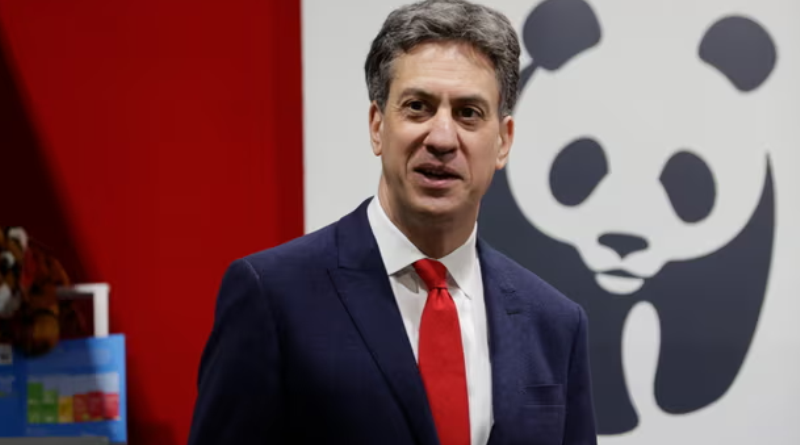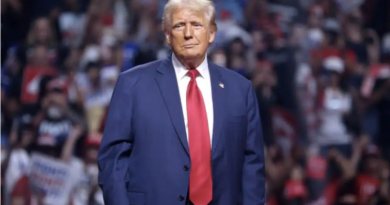UK may unveil tougher emissions targets at Cop29 climate summit
Photo: Ed Miliband hopes to propel the UK into a leadership position on the world stage at climate negotiations. Photograph: Murdo MacLeod/The Guardian
Campaigners hail Labour’s ‘proactive approach’ after series of policy U-turns under Conservatives
The UK government is considering making further commitments on cutting greenhouse gas emissions, likely to be announced at the UN climate summit this year.
It is hoped the plan will help kickstart global ambitions on cutting emissions and encourage other countries to follow suit.
Ed Miliband photographed in Millbank, central London, against the reflection of trees in building glass
Labour will take global lead on climate action, Ed Miliband vows
Read more
Under the Paris climate agreement countries are obliged to submit more stringent targets on emissions in February, if the world is to have any chance of holding global temperature rises to within 1.5C of preindustrial levels.
But Ed Miliband, the secretary of state for energy security and net zero, hopes to announce a new target months early, and has the support of Keir Starmer, the prime minister, in trying to propel the UK into a leadership position on the international stage at climate negotiations.
Starmer attended the previous summit, Cop28, when he was leader of the opposition and has been invited to Cop29, which will take place in Azerbaijan in November.
Activists representing developing countries told the Guardian the global south would welcome UK plans for the early publication of its emissions-cutting plan, known as a nationally determined contribution (NDC).
Harjeet Singh, the global engagement director for the Fossil Fuel Non-Proliferation Treaty Initiative, said: “The UK has a critical opportunity to set the bar for climate leadership and equity by announcing a robust NDC well ahead of Cop29. This proactive approach would signal to other developed nations the urgency of abandoning fossil fuel production and committing to a future powered by renewables.
“By scaling up domestic investments in clean energy and fulfilling its fair share of climate finance to support developing countries, the UK can play its part in driving a global just transition that leaves no one behind.”
Mohamed Adow, the director of the Power Shift Africa thinktank, said: “In terms of international leadership and diplomacy, the UK has fallen behind badly under the previous government. Being one of the first countries to outline a robust NDC is exactly the sort of thing we want to see to show the UK is under new management.
“It would be good to see the UK including its fossil fuels phase-out commitment within its NDC. That would set the example that climate plans should be channelled through the UN process rather than announced ad hoc but never formally committed to. This would show the way for others to follow.”
Under the 2015 Paris climate agreement, countries must set out their NDCs containing targets for future emissions cuts on a five-yearly cycle, with a “ratchet” ensuring they are strengthened each time. The UK’s current NDC pledges a 68% cut in emissions by 2030 compared with 1990 levels.
Miliband has asked the Climate Change Committee to advise on the UK’s next target, for 2035. The Guardian understands the CCC’s recommendation is likely to be published before the autumn budget in late October.
If that does happen, there would be little time before Cop29 to draw up a fully fledged NDC. The UN is hoping for countries to submit NDCs as detailed plans, rather than simple targets, to make their implementation in full more likely.
However, the UK could announce a provisional target and then write a detailed NDC for later submission to the UN that would still be “well ahead” of the deadline for NDCs, as pledged in the joint statement with Brazil earlier this month.
The Cop29 summit will take place from 11 November, days after the US election, making it difficult for the US administration to plan its impact at the negotiations.
France, usually a climate leader under President Emmanuel Macron, is in political turmoil, and the German chancellor, Olaf Scholz, also a robust climate advocate, is facing political headwinds at home.
Those difficulties leave a vacancy on the global stage among powerful developed economies. This month, Miliband showed his intent for the UK to work in partnership with the developing world by visiting Brazil, the current president of the G20 and host of next year’s Cop30. He also held a meeting in London last month with the president of Cop29, Mukhtar Babayev of Azerbaijan.
Next year, Miliband will co-host a conference in the UK with the International Energy Agency.
These efforts stand in stark contrast to the previous government. Under the Conservative prime ministers Theresa May and Boris Johnson, the UK played an important role in international climate negotiations, including hosting the successful Cop26 summit in 2021.
Liz Truss and Rishi Sunak signalled a change in direction, forbidding King Charles from attending Cop27 in 2022 and with Sunak making significant U-turns on climate policy.
Sunak made little impact at last year’s Cop28, spending markedly less time there than other world leaders and meeting few of them.
A spokesperson for the Department for Energy Security and Net Zero said: “The energy secretary will be front and centre of climate negotiations and will personally be leading Cop29 negotiations for the UK. In line with the Paris agreement, we have started planning for our next NDC, which will be submitted at least nine to 12 months ahead of Cop30. No decision on exact timing has yet been made.”
Source: theguardian.com




